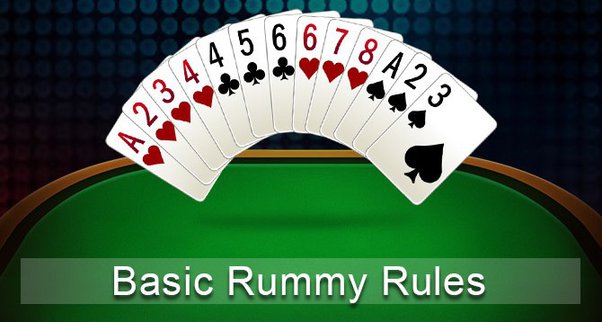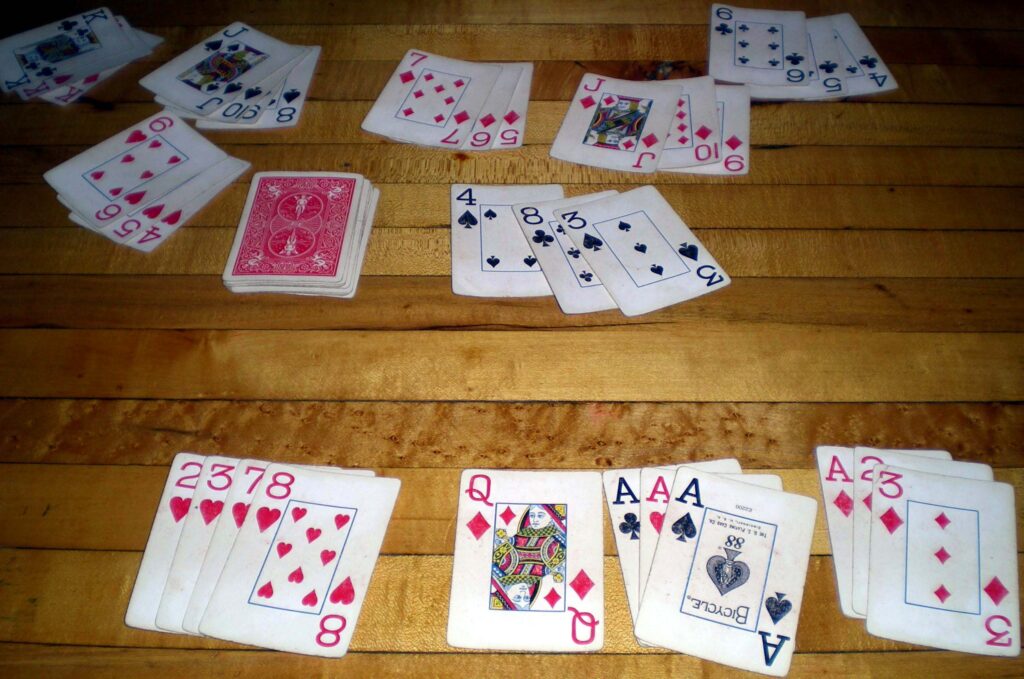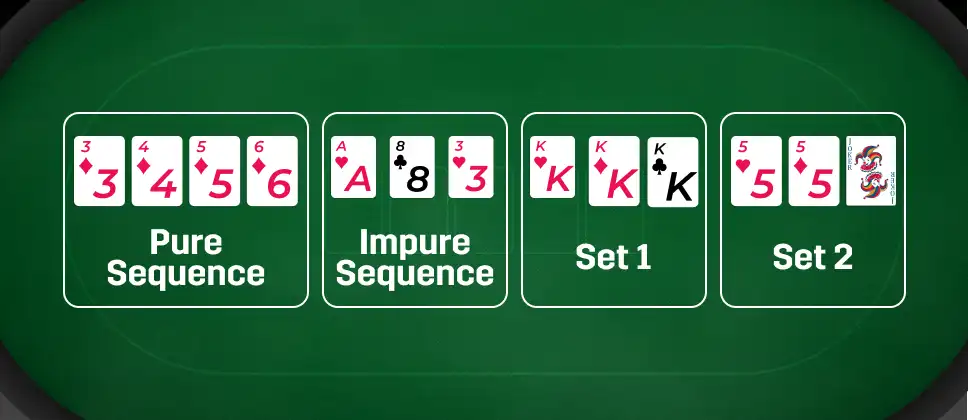
Progressive Rummy Rules
Progressive Rummy rules say that the game builds on the classic Rummy game by introducing a new element. It sets a meld requirement for every round; two Books or three Runs. The player who manages to make these melds first and discards their final card is declared as the winner of that round. The game goes on, with meld requirements becoming more demanding until one player triumphs by having the least penalty points.
Setting Up the Game
The number of decks in progressive rummy rules is adjusted based on the number of players. For a small game night with 2-4 players, you may need two decks. If it’s a bigger group from 5-8 players then three decks might be necessary for everyone to play comfortably. The dealer gives each player a specific number of cards, like 7 or 10.
This starts the process of forming melds by everyone. For selecting the dealer, mix up the deck and ask players to cut it. The person who cuts the highest card will deal first, and then the turn will go in a clockwise direction after each round.
Goal of Progressive Rummy
In progressive rummy rules, the key element is to win quickly and intelligently. It differs from classic Rummy where you aim to discard all your cards; instead here, the focus lies on making melds that are required by each round.
You will hurry to create these melds as you draw and throw away cards. The player who finishes all needed fields and discards their final card first wins the round; this makes it more thrilling because everyone is hurrying to empty their hand.
The Rounds
A special element of surprise: Meld requirements that change every round. In classic Rummy, you always aim for sets and runs, but here the target moves around. This brings a new layer to strategy as each round demands different tactics and thinking from players.
Melding Requirements: In every round, there is a meld requirement that begins the game. It could be needing certain Books or Runs. Normally, these requirements get more challenging as the game goes on.
Also Read: Rajbet Online Casino that Defines the Limit of Entertainment
Race to Finish: Players try to finish all of the required melds for that round before anyone else does. So, they must carefully draw and throw away cards in order to create these needed melds.
Round End: When a player finishes all necessary melds and throws away their last card, the round comes to an end. This player becomes the winner of this round.

Playing a Turn
Progressive rummy rules are all about clever turns. When it’s your turn, you can choose to take one card from the main deck or discard pile. Choosing from the stock gives you new chances, but the discard pile could have what is needed for your meld.
You have to draw one card, and then put down a single card face-up on top of this pile. This is when planning comes into play. Getting rid of a card that looks worthless could actually favor your opponents. Think about the melds you are creating and what cards might impede your advancement.
Types of Melds in Progressive Rummy
Progressive Rummy offers two classic meld options for building your hand:
Books: These are like sets of three or four cards having the same rank. For example, a Book could have three Queens or four Sevens.
Running: These are sets of three or more cards in a row, all belonging to the same suit. An example of a running hand would be a sequence like 5-7 Hearts or running from Jack to King in Spades.
Melding Requirements Progression
The loveliness of progressive rummy rules is that it keeps giving you more difficulties. When moving forward in the game, usually what’s needed for melds tends to become harder. Picture round one as a soft start, where you only need to finish two Books. For round two, we could increase the requirement to three Runs. This raising of difficulty can be maintained as the game progresses, with subsequent rounds demanding more intricate meld combinations.

The Role of Jokers
In Progressive Rummy rules, it introduces a wild card element by adding Jokers to the mix. These special cards can be used as substitutes for any other card in a Book or Run. For example, if you are missing a Queen of Spades in your Run, you can use the Joker instead.
A sneaky Joker placement might do the trick for a while. But, be aware of this exciting twist! If an opponent has the real card that your Joker represents in the meld, they can “steal” it by throwing their card away. This adds another layer of strategy and risk-reward.
Scoring in Progressive Rummy
Progressive rummy rules also say that for each melded card you have kept in your hand, it becomes a penalty point when the round ends. These points are equivalent to the face value of those cards. Therefore, the slower you finish the necessary melds for a round, the more penalty points you gain.
The player who has collected the minimum total of penalty points once all rounds are finished becomes the winner. This way of scoring encourages fast building of melds and thoughtful discarding, making it an engaging and dynamic game.
Variations in House Rules
The basic progressive rummy rules provide an exciting starting point, but you should keep in mind that different households may have their own variations. Whenever you plan to start a game night with a fresh group, it is advisable to cross check any house rules.
A short chat before starting can help everyone to understand the common rules and be prepared for a pleasant game of Progressive Rummy.
Another unique aspect of progressive rummy rules is its strategic twist. Therefore, assemble your team for card-throwing, distribute the decks, and begin a gripping adventure filled with meld construction, clever throwaways and thrilling gambles on jokers. Every round brings fresh goals to achieve.
